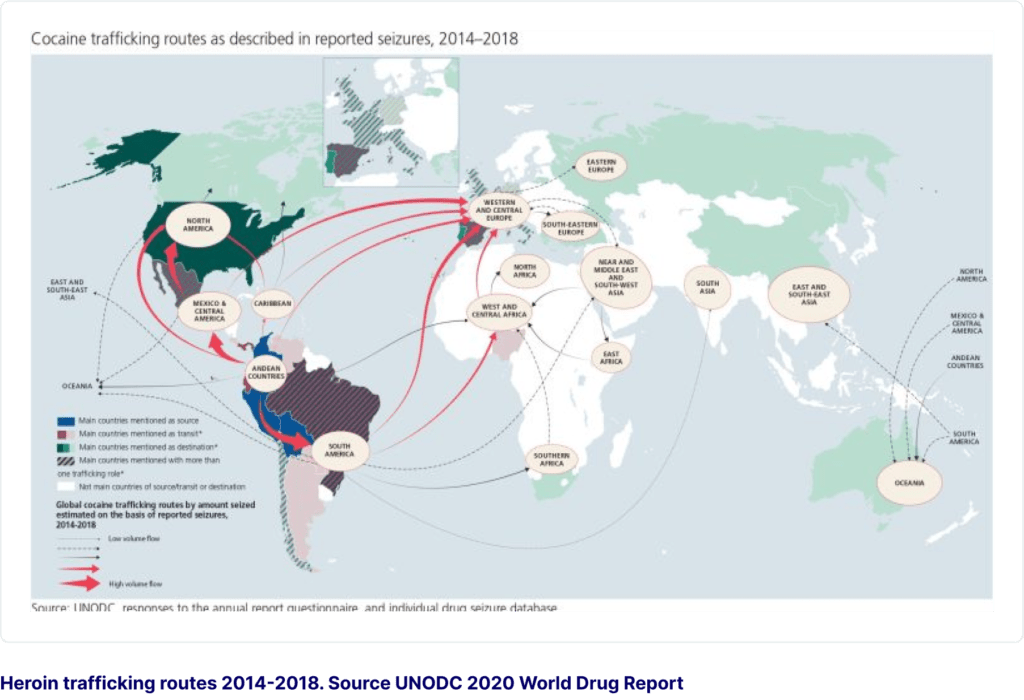While annual shipping losses overall have declined in the past decade, according to AGCS (876 total, averaging 88 per year), maritime security — particularly when it comes to drug trafficking, piracy, and stowaways — remains one of the most critical issues today in the shipping industry.
This is especially true for routes passing through global hotspots like the Gulf of Guinea, South China Sea, the Straits of Malacca, the Caribbean Sea, and the Gulf of Aden.
With a 1500% increase in container carrying capacity in the last 50 years, these security issues not only threaten the safety of onboard crews, but pose significant business implications. There are a number of difficult security issues facing the shipping industry today, but there are also new technology solutions to solve them.
Drug Trafficking Destabilizes Operations
Illicit drug use has been on the increase in the five-year period leading up to 2019, according to the United Nations Office on Drugs and Crime (UNODC) World Drug Report 2020.

Illicit drug use is a booming business, and one that relies on illegal tactics like smuggling – often via cargo ship. UNODC seizure data indicates that most of the cocaine available in European drug markets is smuggled to Europe by sea, for example.
What’s more, the volume has increased over time. In June 2019, officials found a record-breaking 20-tons of cocaine on the MSC Gayane, smuggling it onboard using speedboats while it traveled from the Panama Canal up to Philadelphia, Pennsylvania. Concealed in cargo containers, it was at the final port or through an inspection that the drugs came to light.
“This amount of cocaine could kill millions – MILLIONS – of people.” – U.S. Attorney William McSwain
Drug trafficking destabilizes operations and creates massive liability issues for shipping companies. Without clear visibility into the day-to-day operations onboard and around the ship, it’s impossible to know whether or not drug trafficking is happening until a routine inspection by external agencies after arriving in a port, particularly if crew members are involved in the act. This leaves shipping companies liable for millions in fines and commercial losses – or even ship confiscation.
Piracy Remains Critical Safety Issue for Crew
While piracy hit its lowest level since 1994 this past year, the specific maritime security threat it creates has become more and more dangerous, moving from petty thefts to kidnapping for ransom (KFR) and violence.
Seafarers aren’t trained soldiers. They don’t carry arms or ammunition. But they are at physical risk depending on vessel trade routes. When pirates attack and board ships — as they did in January 2021, kidnapping 15 and killing 1 crew member on the Liberian ship Mozart or when they kidnapped 15 crew members on board the Maltese chemical tanker Davide B — it represents a matter of life and death.
“Attacks against the Davide B and Mozart are symbolic of the growing problem of piracy in West Africa, with an increase in the number, sophistication and violence of piracy attacks in the past year. Perpetrators are now well-equipped to target vessels further away from the shore — the furthest crew kidnapping occurred just over 200 nautical miles (nm) from land.” – Captain Rahul Khanna, Global Head of Marine Risk Consulting at AGCS
In 2020, pirates kidnapped 130 crew members in 22 separate incidents in the Gulf of Guinea — the highest ever — representing 95% of all crew kidnappings in the world. Ships also reported 90 incidents of piracy in Asia, with half occurring in the Singapore Strait.
To mitigate these risks, cargo ships typically employ armed guards while passing through the Gulf of Aden, but they’re not a sustainable solution for every piracy hotspot. This tallies up to huge expenses, spending millions of dollars on insurance, crew bonuses, and security services.
Stowaway Incidents Present Logistical Challenges
While the number of incidents of stowaways has decreased in the last decade, the number of stowaways per incident has increased — driven primarily by geopolitical issues across several regions of the world, but particularly on routes from Africa to Europe or North America.
Not only does this represent a physical risk to your crew, it’s also a huge logistical challenge. Ships must follow IMO Guidelines, including a stowaway checklist before leaving port, informing upcoming ports of call about the stowaway, and ensuring their health and safety while on board.
Once crews detect stowaways on board, they must be repatriated to their country of origin (due to visas and migration regulations), costing thousands of dollars in route delays and expenses. Not only does it divert the vessel from its original operation, but additional costs – such as healthcare, food, clothing, and repatriation – make stowaways an unwelcome hazard of doing business.
ShipIn Keeps Crew and Cargo Safe and Secure
Maritime security is an increasing concern for the shipping industry and security threats present significant challenges to the entire global supply chain. While the implementation of ISPS Code in 2004 led to new understanding of best practices to mitigate particular security threats and introduced a new security culture in the industry, these threats continue to evolve.
Today’s shipping companies require a much higher level of vigilance, which is almost impossible to achieve with existing resources and a limited number of crew on board.
With the right technology in place, however, you can detect security risks early and often and keep your onboard crew, cargo, and your vessels safe. With ShipIn, you can:
- Automatically detect suspicious crafts early on and alert the crew to take necessary precautions to deter a piracy attack or prevent possible drug smuggling activities.
- Provide robust access control with digital logging of personnel authorized to board the vessel.
- Assist in effectively implementing the ISPS Code protocols by monitoring unauthorized access to the restricted areas (such as lifeboats, steering gear room, etc.) and digitally logging other activities such as security patrols and stowaway searches.


